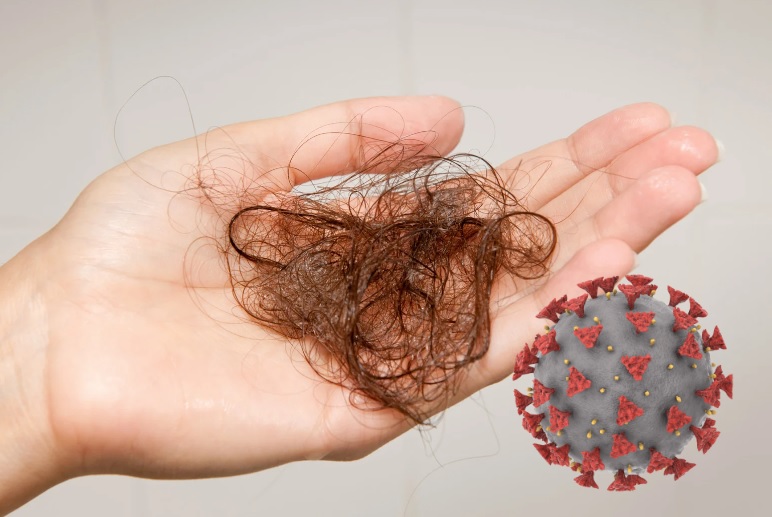
Does COVID-19 cause hair loss?
Hair loss has been reported as a potential consequence of COVID-19 infection, although it’s not a universal symptom and seems to affect a minority of patients. The exact mechanisms behind COVID-19-related hair loss are not fully understood, but several factors may contribute to it:
Physical stress
COVID-19 can cause significant physical stress on the body, which may disrupt the normal hair growth cycle. Severe illness, high fever, and other physiological stressors can lead to a condition called telogen effluvium, where a large number of hair follicles enter the resting phase simultaneously, resulting in increased shedding of hair.
Emotional stress
Dealing with a COVID-19 diagnosis, isolation, or the loss of loved ones can lead to emotional stress, which may also contribute to hair loss. Stress is a known factor in various types of hair loss, including telogen effluvium and alopecia areata.
Direct viral effects
Some researchers suggest that the virus itself may directly affect hair follicles. However, more research is needed to understand the exact mechanisms involved.
Medication side effects
Certain medications used to treat COVID-19, such as antivirals or steroids, may have side effects that include hair loss.
It’s essential to note that hair loss associated with COVID-19 is usually temporary, and most people will experience regrowth once their body recovers from the illness and stressors. However, for some individuals, hair loss may persist or require medical intervention.
How common is COVID-19 hair loss?
The prevalence of hair loss specifically attributed to COVID-19 is not precisely known, as it can vary among individuals and populations. Additionally, not all cases of COVID-19-related hair loss may be reported or documented. However, some studies and anecdotal evidence suggest that hair loss can occur in a subset of individuals who have contracted COVID-19.
In a survey conducted by Survivors Corps, a grassroots movement connecting COVID-19 survivors, approximately 27% of respondents reported experiencing hair loss as a long-term symptom of COVID-19. However, it’s essential to interpret these findings cautiously, as they rely on self-reported data and may not be representative of the entire population.
Furthermore, healthcare professionals have observed cases of hair loss in COVID-19 patients, although it’s not considered one of the most common symptoms of the disease. Most individuals who experience hair loss related to COVID-19 report it as a temporary condition, with hair regrowth occurring within a few months after recovery from the illness.
Overall, while COVID-19-related hair loss can occur, it is not among the most prevalent or widely reported symptoms of the disease. However, for individuals experiencing significant or persistent hair loss after recovering from COVID-19, it’s essential to consult with a healthcare professional for proper evaluation and guidance.
Best treatment options for COVID-19 hair loss
Treatment for COVID-19-related hair loss primarily depends on the underlying cause and severity of the condition. In most cases, COVID-19-related hair loss is temporary and resolves on its own as the body recovers from the illness and associated stressors. However, there are some strategies and treatments that may help promote hair regrowth and manage hair loss symptoms:
Healthy lifestyle habits
Maintaining a balanced diet rich in essential nutrients, staying hydrated, getting adequate sleep, and managing stress levels can support overall health and may promote hair growth. The better you treat your body and the way you live your life, the more your hair will thrive.
Topical treatments
Over-the-counter minoxidil (Rogaine) is a topical medication that is FDA-approved for promoting hair regrowth in both men and women with certain types of hair loss, such as androgenetic alopecia. It may help stimulate hair follicles and promote thicker, fuller hair growth. It’s important to use minoxidil as directed and be patient, as it may take several months to see results.
Alternatively, you could try keratinocyte growth factor (KGF) serum, which is a non-medication topical treatment that can help reduce hair shedding, and promote faster, thicker growing hair.
Prescription medications
In some cases, healthcare providers may prescribe medications such as finasteride (Propecia) for men or spironolactone for women to help manage hair loss. These medications work by blocking the hormones that contribute to hair thinning and may be helpful in certain cases.
Platelet-rich plasma (PRP) therapy
PRP therapy involves injecting a concentration of the patient’s own platelets into the scalp to stimulate hair follicle activity and promote hair growth. While research on PRP for hair loss is still ongoing, some studies have shown promising results in improving hair density and thickness.
Low-level laser therapy (LLLT)
LLLT devices, such as laser combs or helmets, deliver low-level laser light to the scalp, which is believed to stimulate hair follicles and promote hair growth. While the evidence for LLLT in treating hair loss is mixed, some people may find it beneficial, particularly when used in combination with other treatments.
Specialist hair supplements
Specialist hair supplements are dietary supplements specifically formulated to support healthy hair growth, strength, and overall hair health. These supplements often contain a combination of vitamins, minerals, antioxidants, and other nutrients that are believed to promote optimal hair growth and combat issues like hair thinning, breakage, and loss.
The market’s leading and most effective specialist hair supplement is HR23+, of which 9 out of 10 users notice visible improvements in their hair within 3-12 weeks.
Consultation with a dermatologist
If you’re experiencing significant or persistent hair loss after recovering from COVID-19, it’s essential to consult with a dermatologist or healthcare professional who specializes in hair disorders. They can evaluate your condition, determine the underlying cause of your hair loss, and recommend appropriate treatment options tailored to your individual needs.
Summary
It’s important to note that not all treatments may be suitable for everyone, and results can vary from person to person. Additionally, addressing any underlying health conditions and following a comprehensive approach to hair care and overall wellness may help support hair regrowth and minimize hair loss associated with COVID-19 or other causes.
If you’re experiencing significant hair loss or have concerns about your hair health after recovering from COVID-19, it’s advisable to consult a healthcare professional or a dermatologist for proper evaluation and guidance. They can help determine the underlying cause of the hair loss and recommend appropriate treatments or management strategies.


Leave a Reply